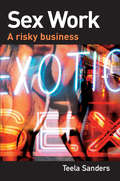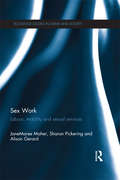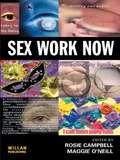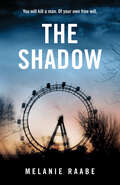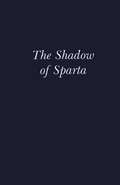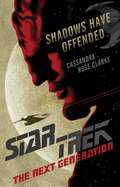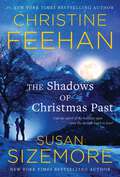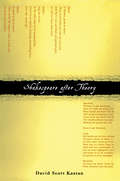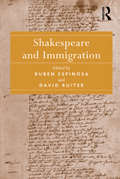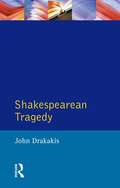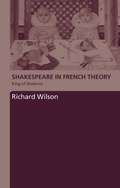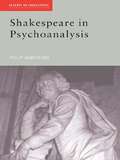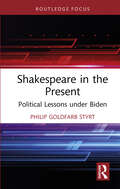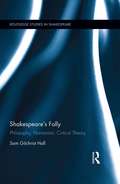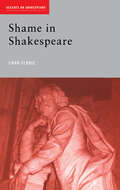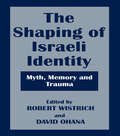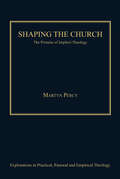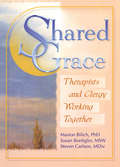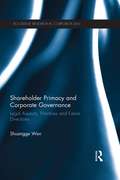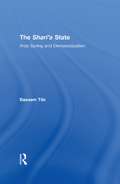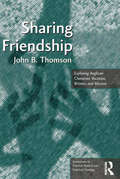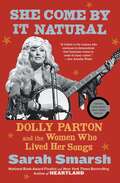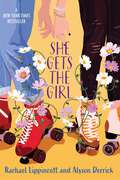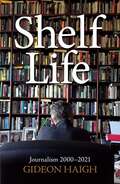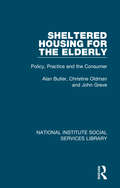Special Collections
Benetech’s Global Certified Accessible Titles
Description: Benetech’s GCA program is the first independent third-party EPUB certification to verify ebook accessibility. By creating content that is born accessible, publishers can meet the needs of all readers. Learn more: https://bornaccessible.benetech.org/
- Table View
- List View
Sex Work
by Teela SandersThis is a richly detailed account of the way the sex industry works, and one of the few empirical studies that investigates the off street industry in Britain. The book seeks to advance a greater knowledge of the social organisation of the sex industry by uncovering the day-to-day activities of women involved in the indoor markets. What types of occupational risks do women experience in work of this kind? How do these hazards affect their personal lives? A key concern throughout the book is to assess whether women are passive victims of the circumstances of prostitution or whether they understand and calculate their responses to danger. Drawing upon both sociological and criminological theories, and on detailed research in the city of Birmingham, the author addresses these questions by estimating the rationality of those responses and by providing a measure of how women make sense of different risks. Sex Work: a risky business describes how women create complex psychological and emotional techniques to maintain their sanity while selling sex, and goes on to argue that the indoor sex markets in Britain have a distinct 'occupational culture' with a set of social norms, code of conduct and moral hierarchies that make it a high regulated workplace despite its illicit and sometimes illegal nature.
Sex Work
by Sharon Pickering and Alison Gerard and JaneMaree MaherSex work has always attracted policy, public and prurient interest. Currently, legal frameworks in developed countries range from prohibition, through partial legalisation to active regulation. Globalisation has increased women’s mobility between developing and developed countries at the same time as women’s employment opportunities in the developed world are shifting. Family and intimate relationships are being transformed by changing demographics, shifting social mores and new intersections between intimate lives and global markets. Sex work is located at the nexus of new intimacies, shifting employment patterns and changing global mobilities. This volume examines the working lives of contemporary sex workers; their practices, their labour market conditions and their engagement with domestic and international regulatory frameworks. It locates the voices and experiences of workers in Melbourne, Australia, at the centre of the sexual services industry as they reflect on brothels and independent escort work, on working conditions and managers, and on the relationships they form with clients. It offers a new account of sex work where women’s labour and mobility is understood as central in local and global imperatives to offer sexual services. It examines how these new imperatives intersect with, challenge and exceed existing regulatory frameworks for sex work. Sex work: labour, mobility and sexual services draws together the everyday practices of sex workers and the broader global markets in which workers negotiate employment. In bringing together these two important intersecting areas, it offers a grounded and innovative account of sex work which will be of interest to academics and policy makers concerned with sex work, gender studies and the sociology of labour.
Sex Work Now
by Maggie O'Neill and Rosie CampbellSex Work Now provides an authoritative overview of female sex work and policy in the UK, and addresses a number of key contemporary issues and debates. These include sex worker unionization, migrant sex work and trafficking, communities and sex work, male clients of sex workers, the policing of prostitution, zoning of street sex work, young people and sexual exploitation, drug use and sex work, exiting, violence and sex work. Throughout the book is shaped by the lives and experiences of sex workers themselves drawing on applied, policy or participatory action research. This book approaches the subject from an interdisciplinary perspective, cutting across conventional boundaries of sociology, criminology, politics and social policy. Contributors to the book include academics, researchers, practitioners and activists who are among the leading commentators on prostitution in the UK. provides overview of sex work in UK considers impact of recent legislation and policy, especially Sex Offences Act 2003 focus on lives and experiences of sex workers themselves
The Shadow
by Melanie RaabeRuth Ware meets Shari Lapena in this internationally bestselling psychological thriller about the inescapable pull of destiny and revenge. Norah Richter has recently moved from Berlin to Vienna, hoping to put her old life behind her. While walking to her new office one morning, Norah is approached by an elderly woman who utters these chilling words: On the eleventh of February, you will kill a man called Arthur Grimm …With good reason. And of your own free will.Norah is unnerved — many years earlier, something terrible happened to her on February 11 — but she chooses to shrug off the encounter as mere coincidence, until a few days later when she meets a man named Arthur Grimm. Soon Norah begins to have a dreadful suspicion: Does she have a good reason to hate this man she’s never met? Could he be responsible for the tragic event in her past? And can Norah make sure that justice is done without committing murder?
The Shadow of Sparta
by Anton Powell and Stephen HodkinsonIn the past twenty years the study of Sparta has come of age. Images prevalent earlier in the 20th century, of Spartans as hearty good fellows or scarlet-cloaked automata, have been superseded by more complex scholarly reactions. As interest has grown in the self-images projected by this most secretive of Greek cities, increasing attention has focused on how individual Greek writers from other states reacted to information, or disinformation about Sparta.The studies in this volume provide new insights into the traditional historians' question, "What actually happened at Sparta?". But the implications of the work go far beyond Laconia. They concern preoccupations of some of the most studied of Greek writers, and help towards an understanding of how Athenians defined the achievment, or the failure, of their own city.
Shadows Have Offended
by Cassandra Rose ClarkeAn original novel based on the acclaimed Star Trek TV series! The USS Enterprise has been granted the simple but unavoidable honor of ferrying key guests to Betazed for a cultural ceremony. En route, sudden tragedy strikes a Federation science station on the isolated planet Kota, and Captain Jean-Luc Picard has no qualms sending William Riker, Data, and Chief Medical Officer Beverly Crusher to investigate. But what begins as routine assignments for the two parties soon descends into chaos: Picard, Worf, and Deanna Troi must grapple with a dangerous diplomatic crisis as historic artifacts are stolen in the middle of a high-profile ceremony…while nothing is as it seems on Kota. A mounting medical emergency coupled with the science station&’s failing technology—and no hope of rescue—has Doctor Crusher racing against time to solve a disturbing mystery threatening the lives of all her colleagues…. ™, ®, & © 2021 CBS Studios, Inc. STAR TREK and related marks and logos are trademarks of CBS Studios, Inc. All Rights Reserved.
The Shadows of Christmas Past
by Christine Feehan and Susan SizemoreDark magic heats up the holiday season as two sizzling New York Times bestselling authors team up for a seductive Christmas collection!Magic is in the air this Christmas—but is it good or evil? In this sexy yuletide anthology from two of the hottest names in paranormal romance, animal instincts take over... In Christine Feehan&’s &“Rocky Mountain Miracle,&” the sparks flying on a remote ranch could melt all the snow in Wyoming when an injured horse brings together a rugged womanizer with a dangerous reputation and an irresistible veterinarian rumored to cast spells. But does her magic touch work on animals and men? A small-town woman is shocked when the injured wolf she takes back to her kennel turns into a man in Susan Sizemore&’s &“A Touch of Harry.&” The only thing more difficult to hide than his stunning escape is the burning desire she feels for this stranger who brings out her wild side.
Shakespeare After Theory
by David Scott KastanThe most familiar assertion of Shakespeare scholarship is that he is our contemporary. Shakespeare After Theory provocatively argues that he is not, but what value he has for us must at least begin with a recognition of his distance from us.
Shakespeare and Immigration
by Ruben EspinosaShakespeare and Immigration critically examines the vital role of immigrants and aliens in Shakespeare's drama and culture. On the one hand, the essays in this collection interrogate how the massive influx of immigrants during the reign of Queen Elizabeth I influenced perceptions of English identity and gave rise to anxieties about homeland security in early modern England. On the other, they shed light on how our current concerns surrounding immigration shape our perception of the role of the alien in Shakespeare's work and expand the texts in new and relevant directions for a contemporary audience. The essays consider the immigrant experience; strangers and strangeness; values of hospitality in relationship to the foreigner; the idea of a host society; religious refuge and refugees; legal views of inclusion and exclusion; structures of xenophobia; and early modern homeland security. In doing so, this volume offers a variety of perspectives on the immigrant experience in Shakespearean drama and how the influential nature of the foreigner affects perceptions of community and identity; and, collection questions what is at stake in staging the anxieties and opportunities associated with foreigners. Ultimately, Shakespeare and Immigration offers the first sustained study of the significance of the immigrant and alien experience to our understanding of Shakespeare's work. By presenting a compilation of views that address Shakespeare's attention to the role of the foreigner, the volume constitutes a timely and relevant addition to studies of race, ethics, and identity in Shakespeare.
Shakespearean Tragedy
by John DrakakisShakespearean Tragedy brings together fifteen major contemporary essays on individual plays and the genre as a whole. Each piece has been carefully chosen as a key intervention in its own right and as a representative of an influential critical approach to the genre. The collection as a whole, therefore, provides both a guide and explanation to the various ways in which contemporary criticism has determined our understanding of the tragedies, and the opportunity for assessing the wider issues such criticism raises.The collection begins by considering the impact of social semiotics on approaches to the tragedies, before moving on to deal, in turn, with the various forms of Marxist criticism, New Historicism, Cultural Materialism, Feminism, Psychoanalysis, and Poststructuralism.
Shakespeare in French Theory
by Richard WilsonAt a time when the relevance of literary theory itself is frequently being questioned, Richard Wilson makes a compelling case for French Theory in Shakespeare Studies. Written in two parts, the first half looks at how French theorists such as Bourdieu, Cixous, Deleuze, Derrida and Foucault were themselves shaped by reading Shakespeare; while the second part applies their theories to the plays, highlighting the importance of both for current debates about borders, terrorism, toleration and a multi-cultural Europe. Contrasting French and Anglo-Saxon attitudes, Wilson shows how in France, Shakespeare has been seen not as a man for the monarchy, but a man of the mob. French Theory thus helps us understand why Shakepeare’s plays swing between violence and hope. Highlighting the recent religious turn in theory, Wilson encourages a reading of plays like Hamlet, Julius Caesar, A Midsummer Night’s Dream and Twelth Night as models for a future peace. Examining both the violent history and promising future of the plays, Shakespeare in French Theory is a timely reminder of the relevance of Shakespeare and the lasting value of French thinking for the democracy to come.
Shakespeare in Psychoanalysis
by Philip ArmstrongThe link between psychoanalysis as a mode of interpretation and Shakespeare's works is well known. But rather than merely putting Shakespeare on the couch, Philip Armstrong focuses on the complex and fascinatingly fruitful mutual relationship between Shakespeare's texts and psychoanalytic theory. He shows how the theories of Freud, Rank, Jones, Lacan, Erikson, and others are themselves in a large part the product of reading Shakespeare. Armstrong provides an introductory cultural history of the relationship between psychoanalytic concepts and Shakespearean texts. This is played out in a variety of expected and unexpected contexts, including: *the early modern stage *Hamlet and The Tempest *Freud's analytic session *the Parisian intellectual scene *Hollywood *the virtual space of the PC.
Shakespeare in the Present
by Philip Goldfarb StyrtShakespeare in the Present: Political Lessons under Biden is the first case study in applying the lessons of Shakespeare’s plays to post-Trump America. It looks at American politics through the lens of Shakespeare, not simply equating figures in the contemporary world to Shakespearean characters, but showing how the broader conditions of Shakespeare’s imagined worlds reflect and inform our own. Clearly written, in a direct and engaging style, it shows that reading Shakespeare with our contemporary Washington in mind can enrich our understanding of both his works and our world. Shakespeare wrote for his own time, but we always read him in our present. As such, the way we read him now is always affected by our own understanding of our own political world. This book provides quick critical analyses of Shakespeare’s plays and contemporary American politics while serving as an introduction for undergraduates and general readers to this kind of topical, presentist criticism of Shakespeare.
Shakespeare's Folly
by Sam HallThis study contends that folly is of fundamental importance to the implicit philosophical vision of Shakespeare’s drama. The discourse of folly’s wordplay, jubilant ironies, and vertiginous paradoxes furnish Shakespeare with a way of understanding that lays bare the hypocrisies and absurdities of the serious world. Like Erasmus, More, and Montaigne before him, Shakespeare employs folly as a mode of understanding that does not arrogantly insist upon the veracity of its own claims – a fool’s truth, after all, is spoken by a fool. Yet, as this study demonstrates, Shakespearean folly is not the sole preserve of professional jesters and garrulous clowns, for it is also apparent on a thematic, conceptual, and formal level in virtually all of his plays. Examining canonical histories, comedies, and tragedies, this study is the first to either contextualize Shakespearean folly within European humanist thought, or to argue that Shakespeare’s philosophy of folly is part of a subterranean strand of Western philosophy, which itself reflects upon the folly of the wise. This strand runs from the philosopher-fool Socrates through to Montaigne and on to Nietzsche, but finds its most sustained expression in the Critical Theory of the mid to late twentieth-century, when the self-destructive potential latent in rationality became an historical reality. This book makes a substantial contribution to the fields of Shakespeare, Renaissance humanism, Critical Theory, and Literature and Philosophy. It illustrates, moreover, how rediscovering the philosophical potential of folly may enable us to resist the growing dominance of instrumental thought in the cultural sphere.
Shame in Shakespeare
by Ewan FernieOne of the most intense and painful of our human passions, shame is typically seen in contemporary culture as a disability or a disease to be cured. Shakespeare's ultimately positive portrayal of the emotion challenges this view. Drawing on philosophers and theorists of shame, Shame in Shakespeare analyses the shame and humiliation suffered by the tragic hero, providing not only a new approach to Shakespeare but a committed and provocative argument for reclaiming shame.The volume provides:· an account of previous traditions of shame and of the Renaissance context· a thematic map of the rich manifestations of both masculine and feminine shame in Shakespeare· detailed readings of Hamlet, Othello, and King Lear· an analysis of the limitations of Roman shame in Antony and Cleopatra and Coriolanus· a polemical discussion of the fortunes of shame in modern literature after Shakespeare.The book presents a Shakespearean vision of shame as the way to the world outside the self. It establishes the continued vitality and relevance of Shakespeare and offers a fresh and exciting way of seeing his tragedies.
The Shaping of Israeli Identity
by Robert Wistrich and David OhanaA dozen essays document the evolution of national myths in Israel as the heroic figures and events of independence and survival transmute into blind fanaticism, great-power manipulation, and traditional colonialism and genocide. Without passing any judgement on the changes, they delve into the meani
Shaping the Church
by Martyn PercyThis book seeks to dynamically alter the way that theologians, ecclesiologists, students of religion and ministers look at the church. Taking the ideas of composition, formation and vocation as basic ecclesial categories, Martyn Percy explores how apparently innocent and incidental material is in fact highly significant for the shaping of theological and ecclesiological horizons. The Introduction sets the tone, with a meditation on how the apparently ordinary scent of a country church can be redolent with meaning, setting the tone of expectation in relation to subsequent worship. This book is not, however, simply about reading meanings into events, ideas, conversations and contexts. Rather, it sets out to faithfully interpret much of the material that surrounds us, yet is often taken for granted, or more usually unnoticed. The book is an invitation to involve the scholar or minister, paying close and patient attention to beliefs, language, artefacts, rituals, practices and other material - all of which are constitutive for ecclesial life and theological identity.
Shared Grace
by Harold G Koenig and Susan Bonfiglio and Marion A Bilich and Steven D CarlsonLearn how theology and psychology can work together to provide effective therapy!Shared Grace provides a framework within which mental health professionals and clergy can work together to provide people in need with appropriate psychological services and spiritual interventions. Breaking down the walls between psychology and religion, this guide offers you proven and tried methods and models from the authors’collaborative work. Comprehensive and intelligent, this vital book will help therapists incorporate a spiritual dimension to their sessions and give patients successful and effective services.Shared Grace is also a book about the healing power of love. It is the very personal, intense account of the authors&’ work to help a woman who suffered from dissociative identity disorder heal from the effects of her childhood abuse. Through this poignant story, you&’ll find that adding a spiritual dimension into psychotherapy brings increased richness and depth to the therapeutic process. Step-by-step practical suggestions for collaboration between therapist and clergy are included. Issues brought to light in Shared Grace include: transforming damaged and dysfunctional images of God the establishment of support systems within the religious community the use of guided imagery the creation of healthy rituals and ceremoniesShared Grace will help therapists and clergy alike and enable each to obtain the support, education, and training to make interdisciplinary collaboration successful.
Shareholder Primacy and Corporate Governance
by Shuangge WenRising defaults in the financial market in 2007, the current widespread economic recession and debt crisis have added impetus to existing doubts about companies’ governance, and cast new light on future trends in shareholder-oriented corporate practice. Taking account of these developments in the field and realising the current need for changes in governance, this book offers a thorough exploration of the origins, recent changes and future development of the corporate objective—shareholder primacy. Legal and theoretical aspects are examined so as to provide a comprehensive and critical account of the practices reflecting shareholder primacy in the UK. In the wake of the financial crisis, this book investigates the direction of future policy, with particular attention to changes in governing rules and regulations and their implications for preserving the objective of shareholder primacy. It examines current UK and EU reform proposals calling for long-term and socially-responsible corporate performance, and the potential friction between proposed legal changes and commercial practices. This book will be useful to researchers and students of company law, and business and management studies.
The Sharia State
by Bassam TibiSet against the backdrop of the Arab Spring, The Sharia State examines the Islamist concept of political order. This order is based on a new interpretation of sharia and has been dubbed "the Islamic state" by Islamists. The concept of "the Islamic state," has been elevated to a political agenda and it is this agenda that is examined here. In contrast to the prevailing view which sees the Arab Spring as a revolution, this book argues that the phenomenon has been neither a Spring, nor a revolution. The term 'Arab Spring,' connotes a just rebellion that led to toppling dictators and authoritarian rulers, yet in The Sharia State, Bassam Tibi challenges the unchecked assumption that the seizure of leadership by Islamists is a part of the democratization of the Middle East. Providing a new perspective on the relationship between the Arab Spring and democratization, this book is an essential read for students and scholars of Middle Eastern Studies, Islamic Studies and Politics.
Sharing Friendship
by John B. ThomsonSharing Friendship represents a post-liberal approach to ecclesiology and theology generated out of the history, practices and traditions of the Anglican Church. Drawing on the theological ethics of Stanley Hauerwas, this book explores the way friendship for the stranger emerges from contextually grounded reflection and conversations with contemporary Anglican theologians within the English tradition, including John Milbank, Oliver O’Donovan, Rowan Williams, Daniel Hardy and Anthony Thiselton. Avoiding abstract definitions of character, mission or friendship, John Thomson explores how the history of the English Church reflects a theology of friendship and how discipleship in the New Testament, the performance of worship, and the shape of Anglican ecclesiology are congruent with such a theology. The book concludes by rooting the theme of sharing friendship within the self-emptying kenotic performance of Jesus’ mission, and looks at challenges to the character of contemporary Anglican ecclesiology represented by secularization and globalization as well as by arguments over appropriate new initiatives such as Fresh Expressions.
She Come By It Natural
by Sarah SmarshIn this Time Top 100 Book of the Year, the National Book Award finalist and New York Times bestselling author of Heartland &“analyzes how Dolly Parton&’s songs—and success—have embodied feminism for working-class women&” (People). Growing up amid Kansas wheat fields and airplane factories, Sarah Smarsh witnessed firsthand the particular vulnerabilities—and strengths—of women in working poverty. Meanwhile, country songs by female artists played in the background, telling powerful stories about life, men, hard times, and surviving. In her family, she writes, &“country music was foremost a language among women. It&’s how we talked to each other in a place where feelings aren&’t discussed.&” And no one provided that language better than Dolly Parton. In this &“tribute to the woman who continues to demonstrate that feminism comes in coats of many colors,&” Smarsh tells readers how Parton&’s songs have validated women who go unheard: the poor woman, the pregnant teenager, the struggling mother disparaged as &“trailer trash.&” Parton&’s broader career—from singing on the front porch of her family&’s cabin in the Great Smoky Mountains to achieving stardom in Nashville and Hollywood, from &“girl singer&” managed by powerful men to self-made mogul of business and philanthropy—offers a springboard to examining the intersections of gender, class, and culture. Infused with Smarsh&’s trademark insight, intelligence, and humanity, this is &“an ambitious book&” (The New Republic) about the icon Dolly Parton and an &“in-depth examination into gender and class and what it means to be a woman and a working-class hero that feels particularly important right now&” (Refinery29).
She Gets the Girl
by Rachael Lippincott and Alyson DerrickShe&’s All That meets What If It&’s Us in this New York Times bestselling hate-to-love YA romantic comedy from the coauthor of Five Feet Apart Rachael Lippincott and debut writer Alyson Derrick.Alex Blackwood is a little bit headstrong, with a dash of chaos and a whole lot of flirt. She knows how to get the girl. Keeping her on the other hand…not so much. Molly Parker has everything in her life totally in control, except for her complete awkwardness with just about anyone besides her mom. She knows she&’s in love with the impossibly cool Cora Myers. She just…hasn&’t actually talked to her yet. Alex and Molly don&’t belong on the same planet, let alone the same college campus. But when Alex, fresh off a bad (but hopefully not permanent) breakup, discovers Molly&’s hidden crush as their paths cross the night before classes start, they realize they might have a common interest after all. Because maybe if Alex volunteers to help Molly learn how to get her dream girl to fall for her, she can prove to her ex that she&’s not a selfish flirt. That she&’s ready for an actual commitment. And while Alex is the last person Molly would ever think she could trust, she can&’t deny Alex knows what she&’s doing with girls, unlike her. As the two embark on their five-step plans to get their girls to fall for them, though, they both begin to wonder if maybe they&’re the ones falling…for each other.
Shelf Life
by Gideon HaighFew journalists exemplify the creed &‘without fear or favour&’ like Gideon Haigh. Shelf Life selects from twenty-one years of writing on myriad subjects by one of our clearest thinkers, sharpest stylists and most curious journalists. Architecture and airline food. Depression and doodling. Goya and Grossman. Weegee and Wire. When not wiring about cricket, Gideon Haigh has enjoyed taking journalism on unexpected journeys, where curiosity calls, into the past and future as well as the present. Edited by Russell Jackson, Shelf Life samples his work from the last two decades: essays, reportage, reviews, crisp analyses, deep dives into history, of no camp, and independent of the news cycle, from his shelves to yours.
Sheltered Housing for the Elderly
by Alan Butler and John Greve and Christine OldmanIn the early-1980s, the ten million people of retirement age in the UK figured prominently among the disadvantaged and deprived. They were heavily over-represented in sub-standard housing and among those in most need of support from the personal social services. One form of social provision which gained rapidly in popularity in the 1960s and 1970s was sheltered housing. It was seen to combine housing with care; provided support while fostering independence; and gave scope for flexibility and experimentation in adapting schemes to local circumstances. By the late 1970s hundreds of schemes were administered, and they were occupied by half a million elderly tenants. Sheltered housing was called ‘the greatest breakthrough in the housing scene since the war’. Extravagant expectations were aroused, and sheltered housing was regarded by some as the solution to all manner of complex problems. Taking the country as a whole, however, relatively little was known about the numbers of schemes and where they were located; who owned them and how they were managed; the aims and assumptions of those who provided or advocated sheltered housing; how the schemes functioned and whether they achieved what they were set up to do; the role, experience and attitudes of wardens; what kinds of people lived in sheltered housing, their history, and how they became tenants; their assessment of the scheme; and much else. The Leeds study, on which this book is based, originally published in 1983, was the most comprehensive and detailed to have been conducted into sheltered housing. It evoked widespread interest in Britain and abroad at the time. It sought to answer some of the important questions about the growth and proliferation of sheltered housing, to evaluate sheltered housing from different points of view – including those of tenants, and to consider the scope for future development. While sheltered housing is the focal topic of the book it should be viewed in the broader context of social policy, administration, professional practice and client experience. The book describes in detail an innovatory and evolving form of social provision and, in doing so, illuminates the operation and impact of policy in action at several levels – from the policy-maker to the consumer, from the organisation of policy to its object. There was significant evidence from the study that many tenants were provided with a service which was not the one they sought, or even needed, but they were given what the agency happened to have – or made – available. Among other topics, the book examines sheltered housing as a response to, or reflection of, myths and prejudices about ageing. It discusses whether elderly people should be compelled to move from familiar surroundings late in life – and how they cope when they do move. The usefulness or otherwise of alarm systems is assessed – with conclusions that throw considerable doubt on their value or reliability. The evolution and modifications taking place in sheltered housing are reported on and the scope for future initiatives is discussed.
